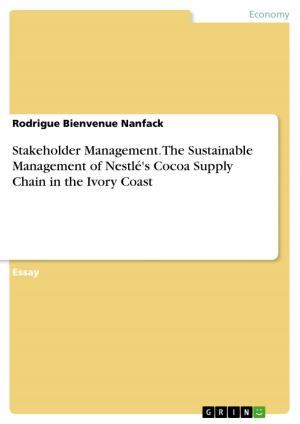The Special Relationship between Great Britain and the USA - Myth or Reality?
Myth or Reality?
Nonfiction, Social & Cultural Studies, Political Science| Author: | Jan Fichtner | ISBN: | 9783638343084 |
| Publisher: | GRIN Publishing | Publication: | January 24, 2005 |
| Imprint: | GRIN Publishing | Language: | English |
| Author: | Jan Fichtner |
| ISBN: | 9783638343084 |
| Publisher: | GRIN Publishing |
| Publication: | January 24, 2005 |
| Imprint: | GRIN Publishing |
| Language: | English |
Intermediate Examination Paper from the year 2003 in the subject Politics - International Politics - Topic: Miscellaneous, grade: 2,3 (B), University of Göttingen, 30 entries in the bibliography, language: English, abstract: Winston Churchill coined the term Special Relationship in his famous speech in Fulton, Missouri in 1946. This term characterises the unparalleled close Anglo-American relations during the Second World War and in the time thereafter. The shared perception that Nazi Germany and the Soviet Union constituted major external threats to their well-being bound the societies and leaderships of Great Britain and the United States together. The looming menace ceased to exist after the break-up of the Soviet Union and the demise of Communism, and for several authors so did the raison d´être of the Special Relationship as well. It was more however that brought these two countries together than the shared perception of a communist threat. Why is it that 'neither country has fully adjusted its mind to thinking of the members of the other society as foreigners', and that Americans still refer to Britain as the 'mother country' every now and then? Why do certain authors call Britain the 'fortified outpost of the Anglo-Saxon race' or the 'unsinkable aircraft carrier'? And is it just by chance that fictional author George Orwell calls Britain 'Airstrip One' and associates it with North America in his novel '1984'? Is it a coincidence or are these - admittedly vague - expressions signs of subtle yet overarching bonds between the two countries? This work will analyse and discuss various aspects of Anglo-American relations. The apparent cooperation in the fields of foreign and security policy will be assessed, as well as the more disguised realm of military and intelligence collaboration. Following is a chapter about two aspects that dominate our time, economy and business in the Anglo-American relationship. The last chapter attempts to illuminate the obscure field of 'private' relations between the Anglo-American nations, as well as the importance of the personal relationships between the individual Presidents and Prime Ministers. For a better understanding of Anglo-American Affairs the common backgrounds of the two countries are assessed historically, culturally and in terms of language. The question or the leitmotif on which this work is be based asks whether the concept of a Special Relationship in current Anglo-American relations is still a de facto reality or just a myth, that lingers on from the shared experience of the two World wars: Does the weary British Lion still enjoy a remarkably 'special' relationship with the almighty American Eagle?
Intermediate Examination Paper from the year 2003 in the subject Politics - International Politics - Topic: Miscellaneous, grade: 2,3 (B), University of Göttingen, 30 entries in the bibliography, language: English, abstract: Winston Churchill coined the term Special Relationship in his famous speech in Fulton, Missouri in 1946. This term characterises the unparalleled close Anglo-American relations during the Second World War and in the time thereafter. The shared perception that Nazi Germany and the Soviet Union constituted major external threats to their well-being bound the societies and leaderships of Great Britain and the United States together. The looming menace ceased to exist after the break-up of the Soviet Union and the demise of Communism, and for several authors so did the raison d´être of the Special Relationship as well. It was more however that brought these two countries together than the shared perception of a communist threat. Why is it that 'neither country has fully adjusted its mind to thinking of the members of the other society as foreigners', and that Americans still refer to Britain as the 'mother country' every now and then? Why do certain authors call Britain the 'fortified outpost of the Anglo-Saxon race' or the 'unsinkable aircraft carrier'? And is it just by chance that fictional author George Orwell calls Britain 'Airstrip One' and associates it with North America in his novel '1984'? Is it a coincidence or are these - admittedly vague - expressions signs of subtle yet overarching bonds between the two countries? This work will analyse and discuss various aspects of Anglo-American relations. The apparent cooperation in the fields of foreign and security policy will be assessed, as well as the more disguised realm of military and intelligence collaboration. Following is a chapter about two aspects that dominate our time, economy and business in the Anglo-American relationship. The last chapter attempts to illuminate the obscure field of 'private' relations between the Anglo-American nations, as well as the importance of the personal relationships between the individual Presidents and Prime Ministers. For a better understanding of Anglo-American Affairs the common backgrounds of the two countries are assessed historically, culturally and in terms of language. The question or the leitmotif on which this work is be based asks whether the concept of a Special Relationship in current Anglo-American relations is still a de facto reality or just a myth, that lingers on from the shared experience of the two World wars: Does the weary British Lion still enjoy a remarkably 'special' relationship with the almighty American Eagle?















